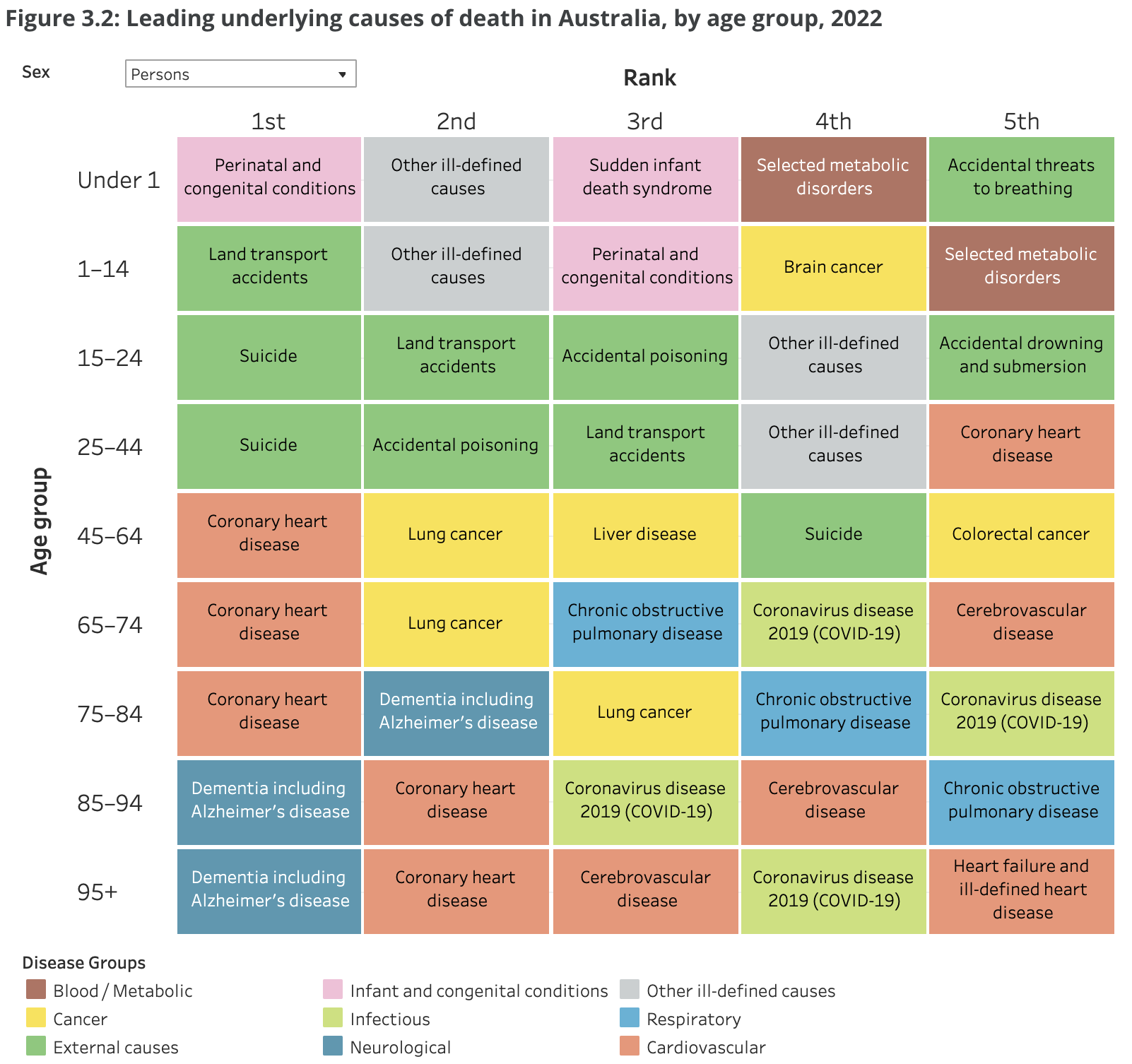Recently I received my first dose of the Oxford-AstraZeneca vaccine. Particularly in Australia there’s been a lot of discussion about the risks of taking this vaccine. I did a bit of thinking about these risks in my own way, and I thought it might be useful for posterity to write out the structure of my thinking.
A disclaimer
Obviously I need to point out that this is just a record of my own way of thinking about this decision. I have no relevant expertise or training (medical or otherwise), and I can’t even be particularly confident that my reasoning is free of basic errors or inconsistencies. The framing below was useful for me but may not be helpful or useful for anyone else. Et cetera, et cetera.
The question I wanted to answer
In a pre-COVID world, I was broadly happy with how much I worried about dying. I felt like I had a pretty good idea of the relative risks I was taking. I wasn’t really worried about dying in a plane crash, or being murdered. But because I had a sense that it was a greater risk, I was careful when driving.
When it came to the AstraZeneca vaccine I didn’t feel like I had a good sense of how much I should worry about any additional risk of death. Given how much I worried under normal circumstances (not much), how much would it be rational for me to worry about dying due to taking AstraZeneca? In other words:
In a world without COVID-19, what is my baseline probability of death, and how much does that increase if I take the AstraZeneca vaccine?
Obviously this is not a very good question to evaluate whether to get vaccinated. We don’t live in a world without COVID. AZ is obviously a safe and highly effective vaccine that will reduce my chance of death given the world we’re living in. There are broad social benefits to high vaccination rates that are greater than the sum of the benefits of vaccination to individuals.
So what I’m trying to do is calibrate how worried I ought to be about the risks to my life of taking the AstraZeneca vaccine.
The micromort
I found the micromort to be a useful device in thinking about this. A micromort is a one-in-a-million chance of death. So, for example, playing a single round of russian roulette has a \(\frac{1}{6}\) chance of death, which is 166,666 micromorts.
As with all probabilities, in general you can’t just add micromort values together. I’m not going to go into the details of it (I’m definitely not an expert), but you have to worry about the extent to which causes-of-death are independent. The principle I’ll apply below is that mortalities that are independent can be summed, which I believe is approximately correct assuming the probabilities are very small.
My baseline probability of death
So the first part of our question is:
In a world without COVID-19, what is my baseline probability of death?
To figure this out I ended up using a report called Deaths in Australia, published by the Australian Institute for Health and Welfare1. This includes a heap of really cool spreadsheets and charts on mortality in Australia, broken up by age, gender and cause-of-death. I thought the following chart was a really really interesting way to illustrate the changing causes-of-death by age.

Going off the 2019 numbers, as an early-30s Australian male I came up with the following death probabilities.
| Cause-of-death | Micromorts per year |
|---|---|
| Suicide | 261 |
| Accidental poisoning | 117 |
| All neoplasms (includes cancers) | 102 |
| Land transport accidents | 72 |
| Assault | 17 |
| Stroke | 17 |
| Others | 283 |
| Total | 852 |
There are a few ways in which these numbers aren’t ideal. My personal risk factors will differ from those of the demographic group as a whole. And while I am deliberately ignoring COVID-19 as a risk, presumably the new world of working-from-home has reduced mortality due to car accidents. But as a rough baseline I think these are pretty good numbers.
Death due to AstraZeneca
The second part of my question is:
How much does my probability of death increase if I take the AstraZeneca vaccine?
Note, again, that for the purposes of this exercise I’m deliberately ignoring COVID-19 as a cause-of-death. Hence, I’m ignoring the substantial effect that taking the vaccine has on my probability of death by COVID-19.
There are a couple of different sources for incidence of blood clots after taking the AstraZeneca vaccine. In March 2021, The UK MHRA indicated an incidence of blood clots as 14.9 per million doses after the first shot, and 1.8 per million doses after the second. The case fatality rate was 18%.2
Advice in Australia places the risk of incidence of blood clots for those under 50 as 3.1 per 100,000 doses.3
Another fact sheet published by the Australian Health Department puts the blood clot incidence at 1.6 per 100,000 doses for the 30-39 age bracket (although the incidence is much higher at 5.0 per 100,000 doses for ages 40-49). Unhelpfully, this document doesn’t describe the fatality rate from blood clot events.4
The Australian TGA publishes a weekly report on COVID-19 vaccine safety. It refers to the ATAGI TSS incidence rates above, but adds information about the outcomes of each of these events. The most recent report at time of writing lists 96 discharged, 14 currently in hospital and 6 deaths.5
So to summarise:
| Source | Incidence of blood clots per 100,000 doses | Fatality rate |
|---|---|---|
| MHRA summary (March 2021)2 | 1.49 (all ages) | 18% |
| Australian figures 3 4 5 | 1.6 (30-39 years) 3.2 (under 50 years) | 6%6 |
Taking a relatively conservative view of these numbers, lets say that for my demographics we’ve got an incidence of 3.2 per 100,000 doses and a fatality rate of 20%. This gives an estimate of 6.4 micromorts as the additional probability of death due to taking the AstraZeneca vaccine. This is very conservative: if I were to use the current Australian fatality rate it would be 1.9 micromorts.
Drawing a conclusion
6.4 micromorts on a baseline of 852 a year provides a really great perspective. It’s approximately a third of the risk that I’d die by homicide or of a stroke this year. It’s comparable to the effect of driving 10% more in a year.7 Given the errors in the baseline figure of 852, the chance of dying due to AZ is essentially a rounding error. Under normal circumstances, I worry very little (or not at all) about having a stroke or being murdered. I should be about a third as worried about dying as a result of taking the AstraZeneca vaccine.
-
Deaths in Australia, along with the accompanying data visualisations ↩
-
Coronavirus Vaccine : Summary of Yellow Card reporting, page 13 ↩ ↩2
-
Is it true? Does the AstraZeneca COVID-19 vaccine cause blood clots? ↩ ↩2
-
Weighing up the potential benefits against risk of harm from COVID-19 Vaccine AstraZeneca ↩ ↩2
-
96 discharged and 6 deaths (ignoring the 14 currently in hospital) \(\frac{6}{96 + 6}\approx6\%\) ↩
-
Assuming that the chance of dying in a car accident scales linearly with time spent driving ↩
